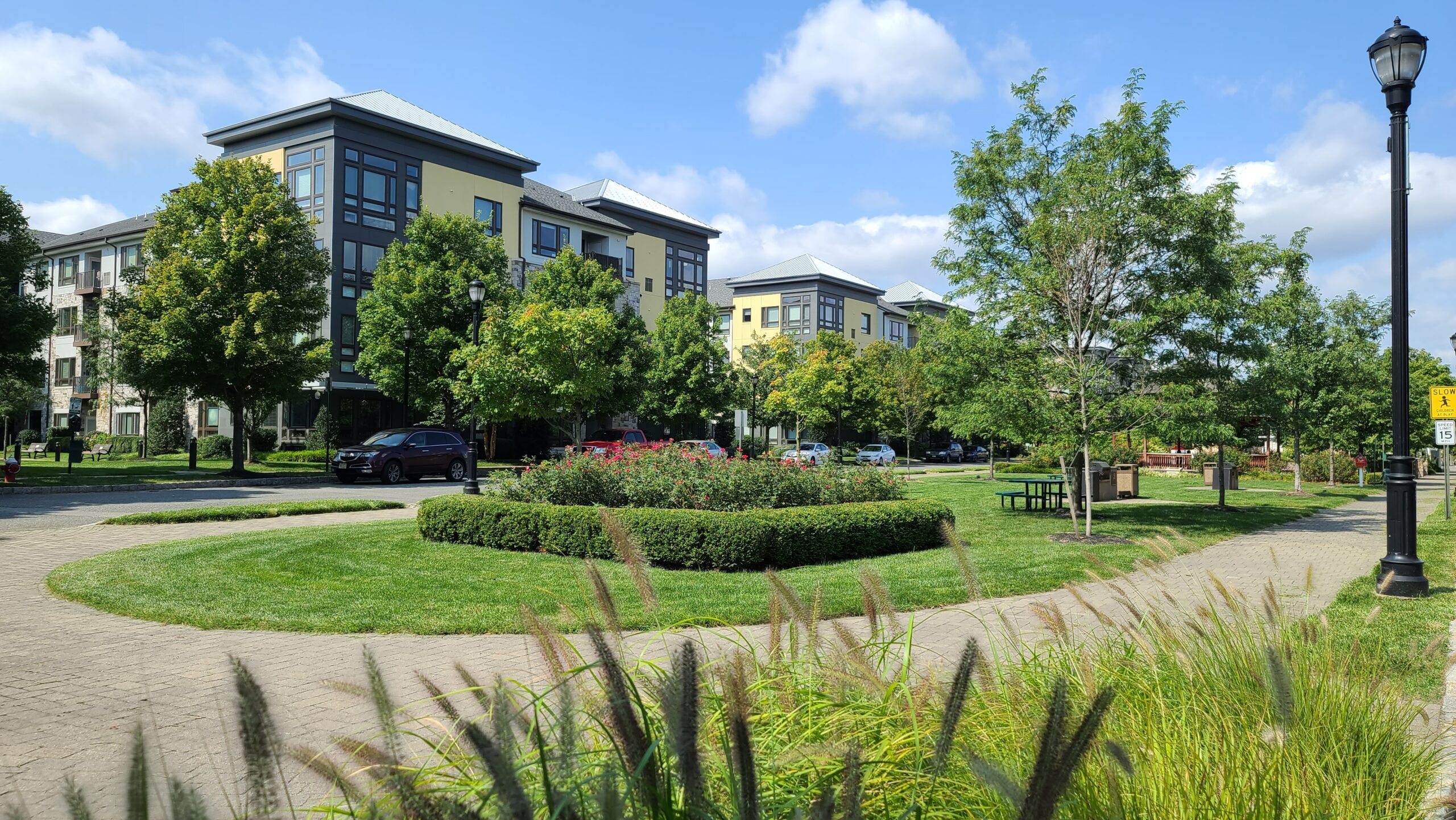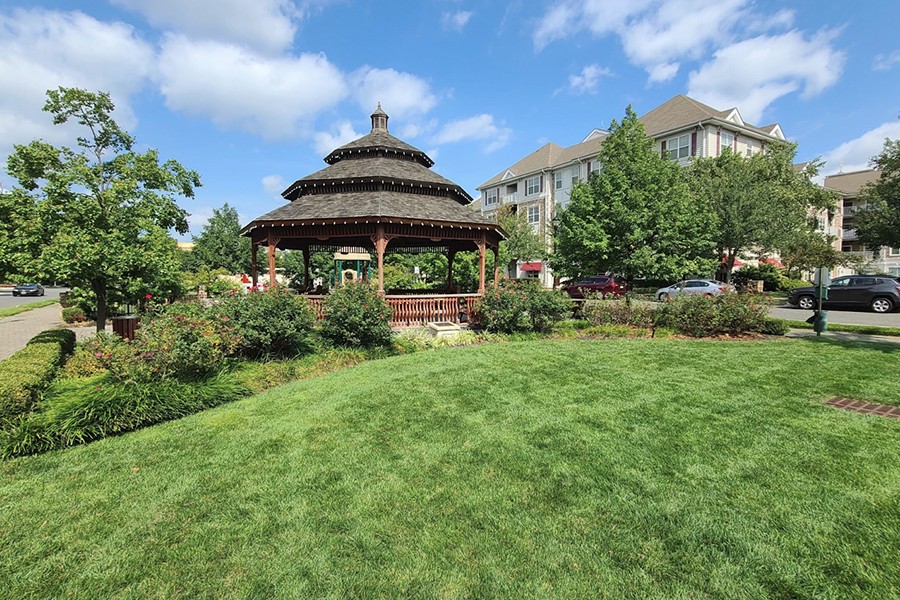When planning, designing, or maintaining a commercial landscape in the Tri-State area, it’s not just aesthetics and functionality that come into play—it’s compliance. Whether you’re upgrading outdoor common areas for an HOA, installing a new irrigation system at a corporate office park, or adding hardscaping to a retail complex, you must navigate a complex network of local regulations, state laws, and industry-specific requirements.
That’s why so many businesses trust Neave Group—we navigate this complexity for you.
Failing to follow these regulations can lead to delayed projects, hefty fines, or the need to redo work that doesn’t meet code. In this guide, we’ll explore the key commercial landscaping regulations for New Jersey, New York, and Connecticut, so you can plan smarter and avoid costly setbacks.
Why Commercial Landscape Compliance Matters
Commercial properties are held to higher regulatory standards than residential landscapes. That’s because commercial landscaping projects often involve:
- Infrastructure (irrigation, drainage, lighting, gas/electric)
- Safety concerns (trip hazards, fire risk, stormwater runoff)
- Environmental protections (wetlands, tree preservation, erosion control)
- Public use and accessibility (ADA compliance, zoning laws)
Regulations ensure these spaces are safe, functional, sustainable, and aligned with community planning goals. For property managers, developers, HOAs, and landscape contractors, understanding what’s required—before a shovel hits the ground—is essential. At Neave Group, we specialize in aligning landscape designs with all applicable codes to help you stay one step ahead.
Navigating Commercial Landscape Regulations in New Jersey
Municipalities and state agencies enforce a layered set of codes and requirements for commercial landscape projects in New Jersey. From zoning restrictions to contractor registration, here’s what you need to know.
1. Zoning and Permitting
Zoning laws vary by township but commonly dictate:
- Setbacks and land use: Certain landscape features must be placed a minimum distance from property lines or sidewalks.
- Buffer zones: Some townships require vegetative screening between commercial and residential properties.
- Stormwater control: If you’re altering grading or adding impervious surfaces, you may need a stormwater management plan.
- Tree removal permits: Some municipalities require approval before removing trees, especially mature or native species.
Before any project begins, it’s important to check local zoning ordinances and reach out to the township zoning office to determine whether planning board approval or building permits are needed. To save you time and hassle, Neave Group facilitates this process by managing communications and submissions with local authorities, giving you back precious time and headaches dealing with red tape.
2. Licensing and Contractor Registration
- Pesticide Applicator License: Commercial landscapers applying herbicides, insecticides, or fungicides must be licensed through the New Jersey Department of Environmental Protection (DEP).
- Home Improvement Contractor Registration: Any landscaping business performing services beyond basic mowing or leaf removal—such as irrigation installation, hardscaping, lighting, or drainage—must register with the NJ Division of Consumer Affairs.
- Landscape Architecture: If a business offers landscape architectural services and does not have a licensed NJ landscape architect on staff, they must contract with one to oversee and sign off on plans.
Our team at Neave Group includes licensed professionals in all required categories, ensuring nothing falls through the cracks. We always ensure compliance so you never have to worry about proper registration of the people working on your commercial landscape.
3. Environmental Regulations
If your commercial landscape project involves areas near wetlands, flood zones, or coastal regions, you may need DEP approval. Regulations protect water quality, native ecosystems, and public safety. Projects involving large land disturbances may also require soil erosion and sediment control plans.
These regulations are often in flux with changing local, state, and federal administrations and priorities. Neave Group ensures your projects are on the right side of environmental regulators to create a property that is both stunning and sustainable.
4. Construction Codes for Outdoor Features
If your landscape renovation includes outdoor structures—such as patios, kitchens, fencing, or fire pits—New Jersey building codes may require specific permits. For example:
- Electrical upgrades for lighting or outdoor kitchens need inspections and approval.
- Gas connections for fire features, ovens, or heaters require licensed professionals and proper permits.
- Drainage, grading, and retaining walls may need civil engineer review and town approval.
This is handled end-to-end by Neave Group when you partner with us for outdoor construction projects in your commercial landscape.
Commercial Landscaping Compliance in New York

New York’s commercial landscaping regulations are shaped by both state-level requirements and local zoning laws that differ greatly from one municipality to the next.
1. Zoning and Local Ordinances
Municipal zoning laws impact what kind of landscaping is allowed, how it can be maintained, and what equipment may be used. Many local ordinances limit noise from landscaping tools, restrict landscaping during certain hours, and regulate visible hardscape elements.
In areas like Westchester County or The Hudson Valley, local design review boards may also need to approve changes to visible landscaping features such as:
- Retaining walls
- Street-facing gardens
- Perimeter fencing
- Landscape lighting
Neave Group is familiar with the nuances of each municipality and helps clients adhere to them with precision.
2. Sales Tax Registration and Certification
In New York, most landscaping services are considered taxable under the category of repair, maintenance, and installation.
- Landscapers must register for sales tax and obtain a Certificate of Authority through the New York State Department of Taxation and Finance before legally performing or billing for services.
Neave Group is fully licensed and registered in the state, so billing and tax compliance are seamless for our clients.
3. Landscape Architectural Licensing
Commercial landscaping design services in New York that involve grading plans, drainage systems, or long-term environmental impact must be overseen by a licensed landscape architect.
Any drawings submitted as part of a commercial project—especially those subject to municipal review—must be stamped and signed by a licensed professional. Our in-house team at Neave Group includes licensed professionals who review and stamp plans to meet municipal requirements.
4. Environmental Protection and Tree Preservation
Urban areas like NYC and surrounding boroughs often have strict guidelines for tree preservation, green roofs, and stormwater control.
- For example, the NYC Department of Environmental Protection may require green infrastructure components in new commercial developments to manage runoff.
- Tree removal in designated areas often requires a permit and replanting plan.
Neave Group ensures your design meets all local and state environmental standards while optimizing aesthetics and usability.
Commercial Landscaping Requirements in Connecticut

Regulations governing commercial landscaping in Connecticut focus heavily on sustainability, water conservation, and environmental protection. Here’s what commercial property owners and landscape contractors need to know.
1. Home Improvement Contractor Registration
Like New Jersey, Connecticut requires any landscaping business providing services beyond lawn mowing to register as a home improvement contractor through the Department of Consumer Protection (DCP). Registration is mandatory for any business engaging in:
- Irrigation system installation
- Tree planting or removal
- Landscape lighting
- Outdoor kitchens or hardscaping
Neave Group is fully registered and equipped to manage commercial landscape service in the state, so all projects are compliant.
2. Landscape Architectural Oversight
When commercial projects involve significant landscape design or grading, a licensed Connecticut landscape architect must prepare and review plans to ensure they comply with state building codes and applicable zoning laws.
All plans must be stamped and signed by a licensed landscape architect prior to submission for review. Neave Group provides complete design-to-build services, including stamped plans and regulatory coordination.
3. Zoning Regulations and Municipal Review
Local municipalities in Connecticut control zoning ordinances that impact commercial landscape designs. These may include:
- Restrictions on fertilizer or pesticide use
- Permitted plant palettes for public-facing spaces
- Noise ordinances around equipment
- Height and material restrictions for outdoor structures
- Drainage and erosion control standards
Neave Group handles municipal reviews and permits on your behalf to keep projects on schedule and up to code.
Why Working With a Professional Matters
Whether you’re installing a new green space in a shopping center, redesigning a hospital landscape, or updating an HOA common area, working with a licensed landscape professional can save time and ensure compliance.
Partnering with Neave Group ensures your project will be handled by experienced professionals who understand both the big picture and the small details.Neave Group brings:
- Familiarity with municipal code and permitting processes
- Established relationships with zoning boards and planning departments
- Certified staff including licensed landscape architects, pesticide applicators, and irrigation experts
- The ability to generate stamped plans and submit formal documentation
- Efficient project management to avoid delays and rework
How Neave Group Helps You Stay Compliant
At Neave Group, we’ve spent decades working across New Jersey, New York, and Connecticut—navigating everything from zoning and permits to stormwater compliance and sustainable design.
When you partner with us, you get:
- Turnkey Landscape Design & Build Services: We handle your project from design and planning through installation and maintenance.
- Permit & Documentation Support: Our team prepares and submits permit applications, zoning approvals, and stamped landscape architectural drawings.
- Regulatory Compliance Assurance: From DEP regulations to town-specific building codes, we ensure every aspect of your project meets local standards.
- Licensed Professionals: We bring together the right experts—licensed landscape architects, electricians, irrigation techs, and more—for a smooth and lawful build.
Stay Ahead of the Curve on Commercial Landscape Compliance
Understanding and adhering to local regulations is critical to the success of any commercial landscape project. From planning and permits to installation and inspection, every step must align with municipal zoning laws, state contractor requirements, and environmental best practices.
Whether you’re overseeing an office park, HOA, retail plaza, or healthcare campus, Neave Group is your trusted partner for smart, sustainable, regulation-ready commercial landscaping in New Jersey, New York, and Connecticut.
Let Neave Group handle the red tape—so you can focus on creating beautiful, functional spaces. Contact us today to schedule a consultation and start your project with confidence. Contact us today for a free consultation.
